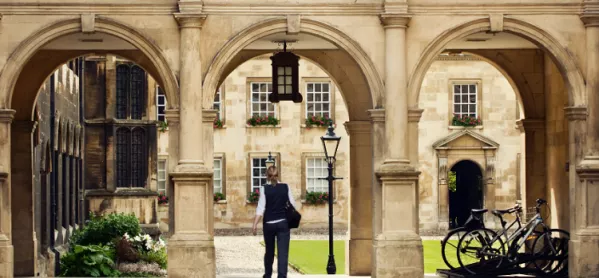- Home
- Six steps to support students through Oxbridge interviews
Six steps to support students through Oxbridge interviews

Teachers want the best for their students, and many have shared with me their concerns that they do not have the expertise to properly support those applying to the most competitive of university courses - in particular to Oxford and Cambridge, who have had several centuries in which to accumulate their mystique.
But the good news is that by applying some simple principles, we can help the young people in our charge to give themselves the best possible chance.
1. Be a calming influence
Many applicants spend the autumn term of Year 13 fretting about the reading and preparation that they should be doing for their interview. Teachers can offer an important calming influence here. The interviewer will not be looking to catch the candidate out, but be more interested in how they think about what they do know, and how they deal with new information. Emphasise that they do not need to demonstrate omniscience in order to impress. An English candidate I supported last year was asked at interview to suggest the authorship of a sonnet she had not seen before. She said Shakespeare, when it was in fact Shelley. She got in.
2. Prepare texts
Preparation should be focused on the areas highlighted in the personal statement. Applicants will often fall into the trap of lavishing praise on books they have read. But they show them greater respect by being prepared to critique them. Here we can save time and increase focus by finding reviews of books cited (googling the name of the book and “review” will often do the job). The reviews will normally highlight where the author’s argument is running counter to the previously prevailing view, giving opportunity to consider its strengths and weaknesses and develop a more nuanced view as a consequence.
3. Practice interviews are a must
Conduct practice interviews, and when you do so try to help the applicant develop a habit of listening to the question and then pausing for long enough in order to be able to deliver a properly considered response. This may seem like common sense, but a frequent, albeit understandable, error in interviews is to leap on a word or phrase and answer a question that has not been asked. If possible, arrange for someone the applicant is not familiar with to interview them, and attend to observe the applicant. The feedback, if delivered with sensitivity and clear guidance as to how to improve, will be invaluable.
4. Preach honesty as the best policy
Most interviews try to move the applicant off ground on which they are comfortable. Sometimes the instinct can be to bluff, for fear of being exposed as ignorant. But the interviewers are expecting ignorance - and they are interested to see how the applicant copes. Being able to hold one’s hands up to having been unaware of something is an important part of teachability, so again in the mock interview setting, have the applicant practice their response. Careful consideration of how the new information or interpretation fits with what they already knew is what interviewers are hoping to see.
5. Lower the stakes
It can often be the desire to secure a place at a famous institution that is one of the biggest impediments. Applicants can place too much importance on an outcome that is far from within their control, and be racked by anxiety as a result. It is helpful to remind them of the reality: if they have been called to interview then they most likely have many other fantastic options, at other universities and beyond. And the result of the interview process is no guarantee of future happiness and success. JK Rowling was rejected; Nick Griffin got in.
6. Learn from your own experience
While there is much that can be done to support students in the closing weeks before the interviews, it is very helpful for teachers to make notes on their experience of providing support, and if possible to (gently) debrief students after their interviews. These insights can then be used to help future applicants. Look to develop a process that begins not in Year 13 or even 12 but further down the school. We cannot know what path our younger pupils will eventually take. But what we do know is that a light-touch approach that helps children pursue and document their interest in their subjects beyond the classroom is one that is worthwhile for every child, regardless of whether there is a dreaming spire at its end.
Andrew Foster is a secondary school and sixth-form teacher and head of education at Tougher Minds. He tweets @AFosterTeach
Keep reading for just £1 per month
You've reached your limit of free articles this month. Subscribe for £1 per month for three months and get:
- Unlimited access to all Tes magazine content
- Exclusive subscriber-only stories
- Award-winning email newsletters



